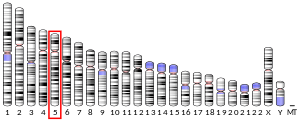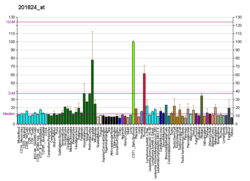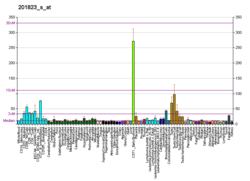RNF14
E3 ubiquitin-protein ligase RNF14 is an enzyme that in humans is encoded by the RNF14 gene.[5][6][7]
Function
The protein encoded by this gene contains a RING zinc finger, a motif known to be involved in protein-protein interactions. This protein interacts with androgen receptor (AR) and may function as a coactivator that induces AR target gene expression in prostate. A dominant negative mutant of this gene has been demonstrated to inhibit the AR-mediated growth of prostate cancer. This protein also interacts with class III ubiquitin-conjugating enzymes (E2s) and may act as a ubiquitin-ligase (E3) in the ubiquitination of certain nuclear proteins. Five alternatively spliced transcript variants encoding two distinct isoforms have been reported.[7]
Interactions
RNF14 has been shown to interact with the Androgen receptor.[5][8][9][10]
See also
References
- GRCh38: Ensembl release 89: ENSG00000013561 - Ensembl, May 2017
- GRCm38: Ensembl release 89: ENSMUSG00000060450 - Ensembl, May 2017
- "Human PubMed Reference:". National Center for Biotechnology Information, U.S. National Library of Medicine.
- "Mouse PubMed Reference:". National Center for Biotechnology Information, U.S. National Library of Medicine.
- Kang HY, Yeh S, Fujimoto N, Chang C (Apr 1999). "Cloning and characterization of human prostate coactivator ARA54, a novel protein that associates with the androgen receptor". J Biol Chem. 274 (13): 8570–6. doi:10.1074/jbc.274.13.8570. PMID 10085091.
- Ueki N, Seki N, Yano K, Masuho Y, Saito T, Muramatsu M (Jun 1999). "Isolation and characterization of a novel human gene (HFB30) which encodes a protein with a RING finger motif". Biochim Biophys Acta. 1445 (2): 232–6. doi:10.1016/s0167-4781(99)00045-7. PMID 10320776.
- "Entrez Gene: RNF14 ring finger protein 14".
- Miyamoto H, Rahman M, Takatera H, Kang HY, Yeh S, Chang HC, Nishimura K, Fujimoto N, Chang C (Feb 2002). "A dominant-negative mutant of androgen receptor coregulator ARA54 inhibits androgen receptor-mediated prostate cancer growth". J. Biol. Chem. 277 (7): 4609–17. doi:10.1074/jbc.M108312200. PMID 11673464.
- He B, Minges JT, Lee LW, Wilson EM (Mar 2002). "The FXXLF motif mediates androgen receptor-specific interactions with coregulators". J. Biol. Chem. 277 (12): 10226–35. doi:10.1074/jbc.M111975200. PMID 11779876.
- He B, Wilson EM (Mar 2003). "Electrostatic modulation in steroid receptor recruitment of LXXLL and FXXLF motifs". Mol. Cell. Biol. 23 (6): 2135–50. doi:10.1128/mcb.23.6.2135-2150.2003. PMC 149467. PMID 12612084.
Further reading
- Ueki N, Oda T, Kondo M, Yano K, Noguchi T, Muramatsu M (1999). "Selection system for genes encoding nuclear-targeted proteins". Nat. Biotechnol. 16 (13): 1338–42. doi:10.1038/4315. PMID 9853615.
- Ito K, Adachi S, Iwakami R, Yasuda H, Muto Y, Seki N, Okano Y (2001). "N-Terminally extended human ubiquitin-conjugating enzymes (E2s) mediate the ubiquitination of RING-finger proteins, ARA54 and RNF8". Eur. J. Biochem. 268 (9): 2725–32. doi:10.1046/j.1432-1327.2001.02169.x. PMID 11322894.
- Miyamoto H, Rahman M, Takatera H, Kang HY, Yeh S, Chang HC, Nishimura K, Fujimoto N, Chang C (2002). "A dominant-negative mutant of androgen receptor coregulator ARA54 inhibits androgen receptor-mediated prostate cancer growth". J. Biol. Chem. 277 (7): 4609–17. doi:10.1074/jbc.M108312200. PMID 11673464.
- Ueda T, Mawji NR, Bruchovsky N, Sadar MD (2002). "Ligand-independent activation of the androgen receptor by interleukin-6 and the role of steroid receptor coactivator-1 in prostate cancer cells". J. Biol. Chem. 277 (41): 38087–94. doi:10.1074/jbc.M203313200. PMID 12163482.
- He B, Wilson EM (2003). "Electrostatic Modulation in Steroid Receptor Recruitment of LXXLL and FXXLF Motifs". Mol. Cell. Biol. 23 (6): 2135–50. doi:10.1128/MCB.23.6.2135-2150.2003. PMC 149467. PMID 12612084.
- Mestayer C, Blanchère M, Jaubert F, Dufour B, Mowszowicz I (2003). "Expression of androgen receptor coactivators in normal and cancer prostate tissues and cultured cell lines". Prostate. 56 (3): 192–200. doi:10.1002/pros.10229. PMID 12772188.
- Wang L, Hsu CL, Ni J, Wang PH, Yeh S, Keng P, Chang C (2004). "Human Checkpoint Protein hRad9 Functions as a Negative Coregulator To Repress Androgen Receptor Transactivation in Prostate Cancer Cells". Mol. Cell. Biol. 24 (5): 2202–13. doi:10.1128/MCB.24.5.2202-2213.2004. PMC 350564. PMID 14966297.
- Colland F, Jacq X, Trouplin V, Mougin C, Groizeleau C, Hamburger A, Meil A, Wojcik J, Legrain P, Gauthier JM (2004). "Functional Proteomics Mapping of a Human Signaling Pathway". Genome Res. 14 (7): 1324–32. doi:10.1101/gr.2334104. PMC 442148. PMID 15231748.
- Lin DY, Fang HI, Ma AH, Huang YS, Pu YS, Jenster G, Kung HJ, Shih HM (2004). "Negative Modulation of Androgen Receptor Transcriptional Activity by Daxx". Mol. Cell. Biol. 24 (24): 10529–41. doi:10.1128/MCB.24.24.10529-10541.2004. PMC 533990. PMID 15572661.
- Yang Z, Chang YJ, Miyamoto H, Ni J, Niu Y, Chen Z, Chen YL, Yao JL, di Sant'Agnese PA, Chang C (2007). "Transgelin functions as a suppressor via inhibition of ARA54-enhanced androgen receptor transactivation and prostate cancer cell growth". Mol. Endocrinol. 21 (2): 343–58. doi:10.1210/me.2006-0104. PMID 17082327.
- Yang Z, Chang YJ, Miyamoto H, Yeh S, Yao JL, di Sant'Agnese PA, Tsai MY, Chang C (2007). "Suppression of androgen receptor transactivation and prostate cancer cell growth by heterogeneous nuclear ribonucleoprotein A1 via interaction with androgen receptor coregulator ARA54". Endocrinology. 148 (3): 1340–9. doi:10.1210/en.2006-0716. PMID 17110431.
- Kikuchi H, Uchida C, Hattori T, Isobe T, Hiramatsu Y, Kitagawa K, Oda T, Konno H, Kitagawa M (2007). "ARA54 is involved in transcriptional regulation of the cyclin D1 gene in human cancer cells". Carcinogenesis. 28 (8): 1752–8. doi:10.1093/carcin/bgm120. PMID 17510080.
External links
- RNF14 protein, human at the US National Library of Medicine Medical Subject Headings (MeSH)
- NURSA C127
This article incorporates text from the United States National Library of Medicine, which is in the public domain.





